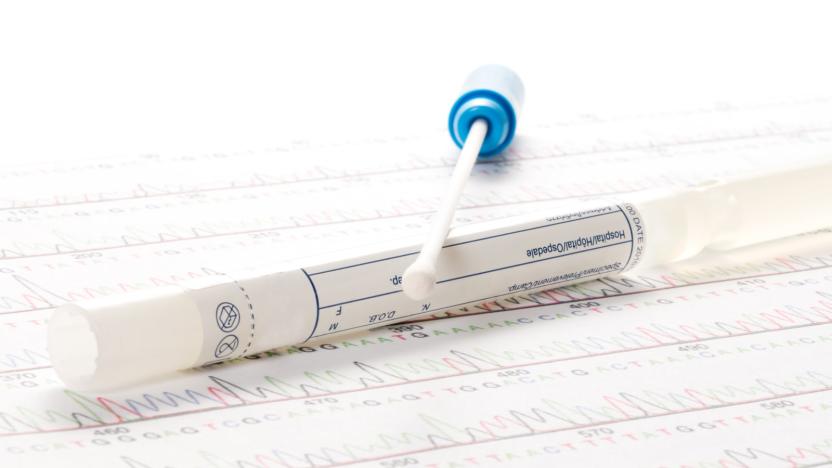FDAapproval
Latest

FDA approves AI-powered software to detect diabetic retinopathy
30.3 million Americans have diabetes according to a 2015 CDC study. An additional 84.1 million have prediabetes, which often leads to the full disease within five years. It's important to detect diabetes early to avoid health complications like heart disease, stroke, amputation of extremities and vision loss. Technology increasingly plays an important role in early detection, too. In that vein, the US Food and Drug Administration (FDA) has just approved an AI-powered device that can be used by non-specialists to detect diabetic retinopathy in adults with diabetes.

The FDA just changed how it reviews genetic health risk tests
FDA Commissioner Scott Gottlieb announced new rules today regarding direct-to-consumer genetic health risk (GHR) tests and the process by which they're approved for sale. In a statement, Gottlieb explained that these sorts of tests can provide more and more information as the technology develops, information that is not only in demand but could also serve as a useful medical tool. "These tests can prompt consumers to be more engaged in pursuing the benefits of healthy lifestyle choices and more aware of their health risks," said Gottlieb. "Consumers are increasingly embracing genetic health risk testing to better understand their individual risk for developing diseases."

First FDA-approved genetic therapy fights leukemia
The first gene therapy treatment has been approved for use in the United States. The FDA greenlit a procedure that uses a patient's own cells to combat a particular type of leukemia, but will only permit it for children and young adults up to age 25.

FDA hasn't confirmed if meatless Impossible Burger is okay to eat
The meatless Impossible Burger has been hard to track down since it debuted last August. Its parent company Impossible Foods promised that a massive new factory would put the faux beef patties in 1,000 restaurants by the end of the year, but that rollout might get hampered by the FDA. The agency isn't sure about what's in the meat substitute: It turns out the ingredient that makes the Impossible Burger look, taste and (er) bleed like beef hasn't been consumed by humans before, and could be an allergen that potentially provokes allergic reactions.

23andMe stops selling DNA health tests following FDA crackdown (updated)
If you've been mulling over getting screened by 23andMe for genetic risks like cancer, we're afraid you'll have to look elsewhere. The company has just announced that it's suspending sales of its health-related personalized DNA kits its health-related genetic tests to comply with the FDA's order, as the agency has yet to conduct tests to prove its accuracy. In a blog post on the company website, co-founder Anne Wojcicki says she's "committed to making sure that 23andMe is a trusted consumer product." For now, the company is focusing on research and ensuring those who purchased a kit before November 22nd still get their results. Folks who bought one after that date will, unfortunately, have to make do with a refund. Oh, and it's worth adding that the company will still offer paternity testing and will happily send you your raw genetic data -- there just won't be any color commentary provided alongside. Update (12/7/13): Well, it looks like 23andMe will continue selling test kits, just not returning health reports to anyone who bought after November 22nd, while the company continues its dialogue with the FDA. A spokesperson told us anyone who buys a kit can still get the firm's Personal Genome Service, which includes genetic ancestry information and raw genetic data.

FDA cracks down on uChek app, working on stricter rules for medical apps
Bloomberg reports that the FDA on May 22 sent a letter to the makers of a biomedical iPhone application named uChek. The app, when accompanied with a separate test strip kit, helps users to perform a self-urinalysis and subsequently monitor a number of health indicators such as protein and glucose levels. These test results can help provide insight into the status of "carbohydrate metabolism, kidney and liver function, acid-base balance and bacteria." Back in February, we reported: The product works by leveraging the iPhone's highly sensitive camera to read tints from inexpensive urine dip stick tests. Developed by Mumbai-based Myshkin Ingawale, an MIT grad, the app shifts monitoring away from expensive clinics and into the home. The app was put on the market by Ingawale's startup, a company called Biosense, and works by using the iPhone's camera to analyze test strips normally designed for visual assessment. On iTunes, the company indicates that the app should only be used with the recommendation of a qualified healthcare professional. That apparently isn't enough for the FDA. Biosense Technologies Private Ltd.'s uChek system isn't cleared by the Food and Drug Administration and the agency said it wants to know why not, in a first-of-its-kind letter to a maker of a mobile-device application. ... The Food and Drug Administration has said it wants stricter rules for apps that directly diagnose or treat conditions, proposing in 2011 to apply similar quality standards as for heart stents, ultrasound machines and other medical devices. Under the FDA's current proposal, the agency would wield some regulatory and approval power over a select number of mobile apps that pose the most risk to consumers in the likelihood of an app not working as intended. Official guidance on the extent of the FDA's role in the approval of medical apps will be finalized later this year, according to FDA spokeswoman Synim Rivers. Biosense, meanwhile, has indicated that it is open to working with the FDA "to ensure that we continue to deliver accurate, affordable and convenient diagnostics across the world." In the meantime, the FDA will wait and see how Biosense responds to its inquiry. Following that, Rivers explained the agency may issue a "warning letter that sets out specific violations of the law must be addressed immediately." You can check out more information as to how the app works over here on uChek's website.

FDA approves Proteus Digital Health's e-pills for dose monitoring
An "ingestible sensor" doesn't sound like the tastiest of snacks, but soon it might be just what the doctor ordered. A tiny microchip which activates upon contact with stomach acid has recently been given the green light by the US FDA. When the sensor is swallowed, an external patch picks up its signal and shoots a message over to whoever it's supposed to. The technology is aimed at tackling an issue known in the healthcare biz as compliance -- or, following instructions. Correct timing and dose are important for many drugs, and lax schedules can be responsible for treatment failures or the development of nasty drug-resistant bugs. Although the pills have only been used in trials, one pharmaceutical heavyweight has already bagged a license to the technology for real-world applications. If you don't like the thought of a belly full of microchips, no need to worry -- the harmless sensors pass naturally after completing their mission.

Hair transplant robot gets FDA approval, men with straight brown hair rejoice
Back in 2007, we told you about Restoration Robotics, an upstart research team using robots to perform hair transplants -- a project whose details (you know, like how it works) were shrouded in secrecy. Four years later, the Artas System has won FDA approval for in-office procedures, with the inviting bot in the above photo harvesting individual hair follicles from the scalp. A few months after this robot operates on your cranium, hair will start growing back, a process that could take a year -- and makes for a more gradual transformation than slapping on a toupee. Still, you'll have to be a certain kind of man to take advantage of this technology -- for now at least, it's only been cleared for men with black or brown straight hair. Looks like the rest of you will have to find other, lower-tech ways to suffer for your beauty.

Portable brain tumor treatment system kills cancer while you take out the trash
We've seen robots that perform brain surgery and lasers that cook tumors, and now a team of researchers are well on their way to bringing mobility to the battle against brain cancer. The NovoTTF-100A, which just received FDA approval, is basically a set of insulated electrodes, attached to an electronic box, that pumps low intensity electrical fields to the site of a freshly diagnosed GBM (glioblastoma multiforme) tumor. The fields, known as Tumor Treatment Fields (TTF), play off the electrically charged elements of cancer cells to stunt the tumor's growth, and may in some cases actually reverse it. A recent test of the system showed comparable results to chemotherapy, without the usual lineup of side effects, including nausea, anemia, fatigue, and infection. Given, patients using the system are expected to wear the thing continuously, but we'd say walking around with a cap full of electrodes is a small price to pay for giving cancer the boot. Full PR after the break.

Brain-controlled robot arm kicks off new FDA program to speed up approval of medical devices
As we've seen, the FDA approval process for medical devices and other gadgets can be a long one, but it looks like things could soon be speeding up considerably. The agency has just announced a new "Innovation Pathway" program that promises to allow for priority reviews of "truly pioneering technologies," which could potentially cut the approval process time in half. Somewhat ironically, however, that program itself will first need some further review before it's broadly deployed, but the FDA has already kicked things off on a limited basis with its first submission: a brain-controlled robotic arm from DARPA. It's not clear which arm that is, but it sounds a lot like the now-famous "Luke" arm developed by Dean Kamen's Deka organization, which just so happens to be funded by DARPA. Head on past the break for the official press release, and a video of the FDA's webcast announcing the program. Update: A tipster has pointed out that the robotic arm in question, and seen briefly in the video after the break, is actually the Modular Prosthetic Limb developed by Johns Hopkins University's Applied Physics Laboratory (now pictured above), not Deka's Luke arm.

Telescopic eye implant approved by the FDA
We love eye implants, and we've seen our share of them, and this one is pretty sweet (although it isn't the creepiest by a long shot -- that prize would go to the one that uses a human tooth to hold its lens). In the works for well over a year, and approved by the FDA a couple days ago, VisionCare Ophthalmic Technologies' implantable miniature telescope is intended for patients over 75 years of age who are suffering from end-stage macular degeneration. As with any tricky new surgery, this one is not without risks, including the need for a corneal transplant due to the device's size. According to CBC News, in clinical testing seventy-five percent of over 200 patients "had their vision improve from severe or profound impairment to moderate impairment," and there are two more studies on the way: one will follow up with existing patients, while the other will outfit 770 new patients with the device. The cost? $15,000.








